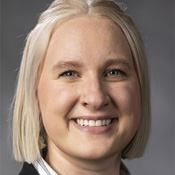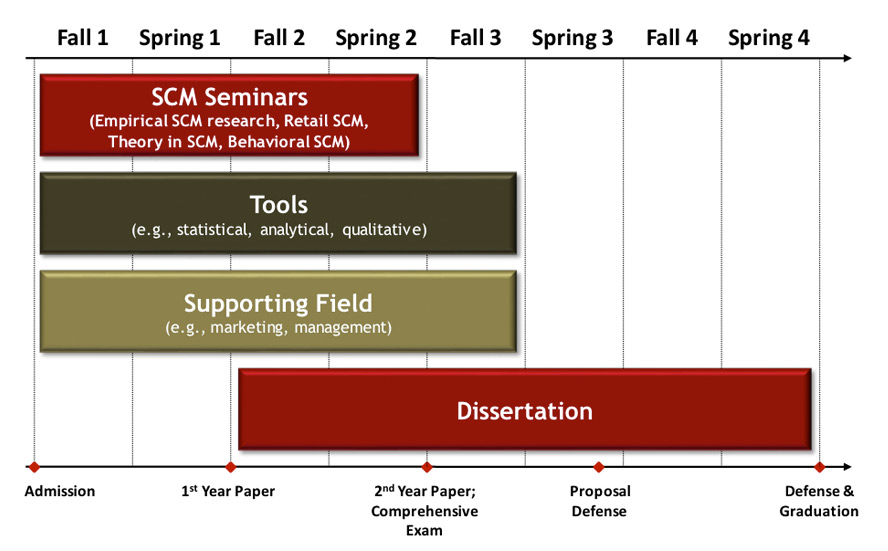Supply Chain Management Ph.D.

All doctoral programs require a valid GMAT/GRE for admissions review.
The Ph.D. Program in Business Administration with an emphasis in Supply Chain Management prepares students for careers in research and teaching in supply chain management.
Program Outcomes
Students in the program gain knowledge in the theoretical and substantive areas of supply chain management. They acquire the conceptual skills and methodological tools necessary to design and conduct independent research and interact with others in academic and business environments. Throughout the program, the faculty works closely with doctoral students, training and mentoring them to become great scholars, educators, and colleagues.
Overview
The purpose of the Ph.D. program in Business Administration with a Concentration in Supply Chain Management is to prepare individuals for academic careers in research, teaching, and service at universities.
Students seeking admission into the doctoral program should have the interest and commitment to pursue the knowledge and skills necessary for academic careers at leading universities and institutions.
Faculty Interaction
Using diverse research traditions including empirical (e.g., survey, secondary data) and mathematical modeling, the Supply Chain Management faculty are actively involved in research in diverse areas such as retailing, forecasting, inventory management, logistics outsourcing, and transportation management.
The faculty work closely with doctoral students, training and mentoring them to become scholars and educators. The normal program size is eight on-campus, full-time doctoral students, allowing for close interaction with the faculty and other students at various stages in the program.
Expectations
Students admitted to the doctoral program are expected to acquire:
- Knowledge of the various areas of study that constitute the field of supply chain management and develop an integrative understanding of relationships among these areas
- Knowledge and skills to design, conduct, execute, and evaluate research that is publishable in leading journals
- A tradition of scholarship and excellence in teaching and learning.
Contact
Graduate School of Business
Sam M. Walton College of Business
University of Arkansas
Willard J. Walker Hall 310
Fayetteville, AR 72701
(479) 575-2851 p
GSB@walton.uark.edu
Hear more about the Ph.D. Program
Admissions Requirements for Ph.D. Programs
Applicants who wish to apply for the doctoral program with an emphasis in Supply Chain Management must submit their applications to the Graduate School of Business by December 15th.
Learn more about admissions requirements.Selection Criteria
We welcome candidates who are strongly committed to being part of a full-time Ph.D. program and show motivation and commitment towards meeting the requirements for our degree. We take a holistic approach in assessing candidates by taking into account their past scholastic record, letters of recommendation, test scores, prior work experience, and a statement of purpose. Prior research or teaching experience is desirable but not required. We especially encourage students to establish early contact with the Senior Ph.D. Program Director, David Dobrzykowski (ddobrzykowski@walton.uark.edu), or the Junior Ph.D. Program Director Iana Shaheen (ishaheen@walton.uark.edu), who will then work with potential applicants to assess their likely fit and work with them through their application process.
Research Highlights
 Satabdi Hazarika
|
2024 Finalist, Doctoral Research Showcase best paper award at Decision Science Institute
(DSI) annual meeting.
2024 Finalist, Grosvenor Plowman best paper award at Council for Supply Chain Management
Professionals (CSCMP) annual meeting.
|
 Travis Kulpa
|
2024 Outstanding doctoral dissertation award at the academic research symposium of the Council for Supply Chain Management Professionals (CSCMP), 2021. |

Finn McKinley
|
2024 Finalist for the Chan Hahn best paper award, Operations and Supply Chain Management
Division, Academy of Management annual meeting.
2024 Finalist, Grosvenor Plowman best paper award at Council for Supply Chain Management
Professionals (CSCMP) annual meeting.
|
 Nicolo Masorgo
|
2024 Finalist, Bernard La Londe best paper award, Journal of Business Logistics. 2023 CSCMP Doctoral Dissertation Award Winner. Title: Sharing Economy Last Mile Delivery: Three Essays Addressing Operational Challenges, Customer Expectations, and Supply Uncertainty. (Placed: Miami University (Ohio)) 2023 Council for Supply Chain Management Professionals (CSCMP) 2023 E. Grosvenor Plowman Award Runner-up. Title: Sorry, We Arrived…Early! The Role of Delivery Punctuality and Delivery Window Length in Shaping the Customer-Retailer Relationship. 2022 Council for Supply Chain Management Professionals (CSCMP) E. Grosvenor Plowman Award (Best Paper). Title: Time is Ticking: The Role of DC Operations and Transportation in Avoiding Late Orders in Online Retailing. |
 Bekki Brau
|
2024 Jack Meredith best paper award, Journal of Operations Management.
2024 Finalist for the Chan Hahn best paper award, Operations and Supply Chain Management
Division, Academy of Management annual meeting.
2022 University of Arkansas Graduate School Distinguished Dissertation Award. Title: Integrating Systems, Processes, and Human Judgment: Three Essays on Value Creation with Supply Chain Analytics 2021 CSCMP Doctoral Dissertation Award Winner. Title: Integrating Systems, Processes, and Human Judgment: Three Essays on Value Creation with Supply Chain Analytics 2021 Chan Hahn Best Paper Award Finalist, Operations & Supply Chain Management (OSCM) Division, Academy of Management (AOM). Title: Integrating Machine Learning and Human Judgment: A Study on Demand Planning in the Field 2020 Best Student Paper Award Finalist, Operations & Supply Chain Management (OSCM) Division, Academy of Management (AOM). Title: When Managers Meet Models: Integrating Human Judgment and Analytics 2018 First place poster award at the Academic Research Symposium at the annual meeting of the Council for Supply Chain Management Professionals (CSCMP). |
 Jonathan Phares
|
2023 Grosvenor Plowman best paper award, at Council for Supply Chain Management Professionals
(CSCMP) annual meeting.
2022 Finalist, Grosvenor Plowman best research paper award at Council for Supply Chain
Management Professionals (CSCMP) annual meeting.
|
 Yanji Duan |
2023 Outstanding Paper Award, International Journal of Physical Distribution and Logistics Management.
2022 Finalist, Grosvenor Plowman best paper award at Council for Supply Chain Management
Professionals (CSCMP) annual meeting.
2020 Finalist, Grosvenor Plowman best paper award at Council for Supply Chain Management
Professionals (CSCMP) annual meeting.
2020 Best Supply Chain Paper, Sponsored by the Institute for Supply Chain Management,
Academy of Management.
2019 Nominated for the Grosvenor Plowman best paper award at the Academic Research Symposium of the annual meeting of the Council for Supply Chain Management Professionals (CSCMP). |
 Ellie Falcone
|
2023 Journal of Business Logistics Bernard J. LaLonde Best Paper Award. Title: Supply Chain plasticity during a global disruption: Effects of CEO and Supply Chain networks on Operational Repurposing 2019 Honorable mention poster award at the Academic Research Symposium at the annual meeting of the Council for Supply Chain Management Professionals (CSCMP). |
 Siqi Ma |
2023 Runner up for the Hau Lee Best Supply Chain Management Paper, published in Production and Operations Management. 2018 Chan Hahn best paper award at the Academy of Management Operations and Supply Chain track. |
 Rajib Dutta
|
2022 Decision Sciences Institute Conference Best Theory-Driven Empirical Paper Award. Title: How CMS Incentive Payments Influence IT Related Infrastructural Decisions, Operational Risk and Performance in Hospitals |
 Llord Brooks
|
2022 Academy of Management Best Student Paper Award Finalist in Operations and Supply Chain Management. Title: Faith in Disasters: The Influence of Religion on Humanitarian Relief Operations |
 Simone Peinkofer |
2017 Honorable Mention, Doctoral Dissertation Award, Council for Supply Chain Management Professionals (CSCMP). |
 Saif Mir |
2017 Harold A. Fearon award for the best paper published in the Journal of Supply Chain Management. 2017 Grover Plowman best paper award at the Academic Research Symposium of the annual meeting of the Council for Supply Chain Management Professionals (CSCMP). |
Program Structure & Curriculum
The Ph.D. Program in Business Administration with a Supply Chain Management Concentration prepares individuals for research, teaching, service, and collegial roles in Supply Chain Management/Logistics/Transportation departments.
Course work for the Ph.D. Program in Business Administration with a Supply Chain Management Concentration is typically completed during the first two and a half years of the four-year program. Students take a total of 14 courses and normally enroll in three courses per semester. The course work comprises of five SCM core Ph.D. seminars, three seminars in a supporting field, and five methods classes.
SCM Core Seminars (15 hours)
Each doctoral will take five SCM Core Ph.D. seminars.
SCMT 64103: Fundamentals of Logistics and Supply Chain Management
This course introduces students to the key substantive areas of logistics and supply chain management through a combination of lectures covering topics such as inventory control and forecasting and seminars discussing associated academic literature.SCMT 64303: Supply Chain Management Research
In this seminar, students will review and discuss a broad cross-section of research articles in the realm of supply chain management. During the discussions particular emphasis will be placed on the interest and merit of the research question(s), the appropriateness of the theoretical framework and/or hypothesis development, the adequacy of the research design, incl. data collection, measurement, and analysis (methodology), the accuracy of the discussion of the results. Each week’s readings will follow a common theme (content area and/or methodology), such that students will be familiarized with a wide range of relevant SCM literature and (mostly empirical) methodologies.SCMT 64403: Theory in Supply Chain Management
In this seminar, students will be exposed to key theories from fields such as strategic management and marketing and will learn about how these theories have been or can be applied to supply chain management research. Each week’s readings comprise about 3-4 conceptual and empirical research articles. During the discussion particular emphasis will be placed on the main premises of each theory, comparing and contrasting the inter-relationships among these theories, identifying applications of such theories to supply chain management research questions, and the critique of the use of theory in the context of the hypothesis development.SCMT 64503: Behavioral Supply Chain Management
The focus of this seminar is human behavior as it pertains to creating value in the supply chain and beyond. Topics may include but will not be restricted to behavior in inventory and ordering processes, in retail replenishment, in global supply chain management, in the face of adversity and catastrophic supply chain risk, and in supply chain relationships.SCMT 64603: Research in Retail Supply Chain Management
The focus of this seminar is research in retail supply chain management. As retailers have become more powerful members of their supply chains, retail-specific supply chain management research has become more prevalent in the literature. Seminar topics may include but will not be restricted to retail sales and order forecasting, inventory management, and store execution issues.The department offers each seminar every other year, such that students will take these seminars in the spring and fall semesters of their first and second years in the program, respectively. These seminars are designed to teach students a range of theories, concepts and research capabilities relevant to the domain of SCM.
SCM Tools (15 hours)
Depending on their interests and background, students will choose five courses from
the following list:
- Univariate statistics (min. 3 hours; e.g., ISYS 52003
(prior course work may be applied toward this requirement - Multivariate statistics (min. 3 hours; e.g., MKTG 64303, ISYS 56203, ISYS 57203)
- Econometrics (min. 3 hours; e.g., ECON 56103/66203/66303)
- Structural equation analysis (e.g., ISYS 64203)
- Other (e.g., linear programming, integer programming, stochastic processes, qualitative research methods, etc.)
Supporting Fields (9 hours)
Courses for the supporting fields requirement are selected in consultation with the student's Ph.D. Program Advisory Committee. All courses taken for the supporting fields requirement must be at the graduate level and/or taken for graduate credit. A minimum of six hours should be taken in graduate research seminars.
Typical Ph.D. Program Structure and Timeline

Registration
The departmental Ph.D. program coordinator will work with each doctoral student to define a set of courses that meets the requirements outlined above as well as the student's needs and interests. To that end, each student should meet with the departmental Ph.D. program coordinator before June 30 for registration for the fall semester, and before November 30 for registration for the spring semester (a hold will be placed on each doctoral student's account and will only be lifted after this meeting).
First and Second Year Paper Requirements
Students are expected to complete publishable research articles by the end of their first and second years, respectively. First-year papers may be co-authored with other doctoral students, but the student is expected to significantly contribute during all stages of the research process. Second-year papers should be completed by each doctoral student individually (under guidance and supervision of a faculty member). Failure to satisfactorily complete the first and second year paper requirements may result in the student's termination from the Ph.D. program.
Annual Review
Each doctoral student is subject to an annual review to assess the student's progress and performance in the program and to discuss the student's plans for the subsequent academic year. All review forms must be submitted to the Graduate School by June 30 of each year. Hence, it is suggested that the student meet with the departmental Ph.D. program coordinator by June 15 of each year. The departmental Ph.D. program coordinator may also seek input from the student's adviser in completing the student's annual review.
Comprehensive Exam
Following completion of SCM core coursework, students take written and oral comprehensive exams at the end of their second year in the program.
The comprehensive exam is a closed book, closed notes exam and is taken in a timed and controlled environment. The exam consists of a set of questions developed by the SCM faculty. These questions are designed to offer the student an opportunity to display his or her knowledge of the literature, theories, concepts and tools in the domain of SCM. Particular emphasis is placed on the application of these elements to investigate a given research question. The comprehensive exam may also contain questions that are geared toward a student's particular dissertation research interests.
The oral comprehensive exam is given several weeks after the written comprehensive exam. Typically, the student will be given an opportunity to elaborate on or clarify any of his or her answers from the written comprehensive exam. In addition, the examining committee may choose to discuss any other relevant topic, including but not limited to the student's research.
Students who receive a passing grade on the comprehensive exams advance to candidacy. Students who receive a failing grade on the comprehensive exam may, with approval of the student's examining committee, retake the exam once. Failure to pass the exam after two attempts will result in the student's termination from the doctoral program.
Dissertation (18 hours)
A dissertation will be written under the guidance of Supply Chain Management faculty who will chair the student's dissertation committee. In addition to the chair, the dissertation committee will include a minimum of two additional graduate faculty members. One graduate faculty member outside the Supply Chain Management Department may be chosen for this committee depending on the dissertation topic.
Near the end of the third year in the program, students must successfully defend their dissertation proposal. Each student is required to share a written dissertation proposal no later than two weeks prior to the scheduled dissertation proposal defense. The scope of this proposal will be defined by the student's adviser and will typically include a draft of key sections, including the introduction, literature review, theory/hypothesis development and methodology sections. In the case of a multi-essay dissertation, the proposal should, at a minimum, include a detailed draft of the first essay and an outline of the other essays. The dissertation proposal defense most often consists of two parts. First, the student will give a presentation outlining his or her dissertation. This presentation is followed by Q&A and/or a discussion of the student's dissertation research. Hence, the purpose of the dissertation proposal is twofold: a) the examining committee assesses the student's research capabilities (i.e., the ability to conduct meaningful and rigorous research and to defend his or her work), and b) the examining committee will work with the student to identify potential weaknesses and areas that may need improvement. The dissertation committee will determine whether the student satisfactorily defended his or her dissertation proposal. Failure to do so may result in a second proposal defense being scheduled at a later date or in the termination of the student from the Ph.D. program. This decision will rest with the student's dissertation committee.
The successful completion and defense of a dissertation are an integral requirement of the Ph.D. program. During the dissertation defense, the committee members will verify that all their concerns/criticisms have been adequately addressed. The student may be asked to provide further explanation/justification on a select number of issues. In addition, the student may be asked to make some further revisions prior to submitting your final dissertation to the Graduate School. Failure to satisfactorily defend the dissertation will result in the student's termination from the Ph.D. program.
Teaching
As future faculty members, doctoral students not only acquire critical research skills, but also gain teaching experience. Each student will typically teach two undergraduate classes per academic year, starting in the second year of the program. These teaching assignments are a part of the students' graduate assistantships. In their first year in the Ph.D. program, doctoral students will attend a semester-long seminar series offered by the Walton College's Center for Teaching Effectiveness. The goal of these seminars is to give future instructors practical advice on a broad variety of teaching-related issues. The Center also offers mentoring and coaching services to first-time student teachers.
Support
Students in the program are supported financially with tuition waivers and nationally competitive stipends (i.e., graduate assistantships) for four full years (up to $39,800 per year for outstanding candidates), assuming satisfactory progress in the program. The department, college, and university also provide a broad range of support for doctoral student research. For example, doctoral students are funded to attend major domestic and international conferences to present research papers.
Faculty are integrally involved with doctoral students on research targeted for publication in major journals. Recent articles coauthored by Supply Chain Management faculty and doctoral students have appeared in the Journal of Business Logistics, Journal of Retailing, Journal of the Academy of Marketing Science, Transportation Journal, and other top-tier academic journals.
